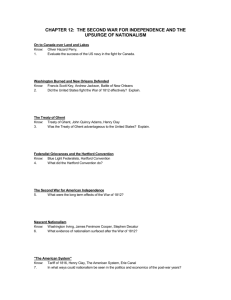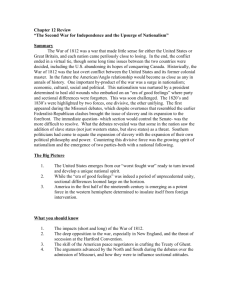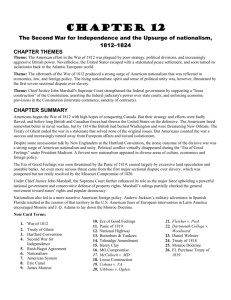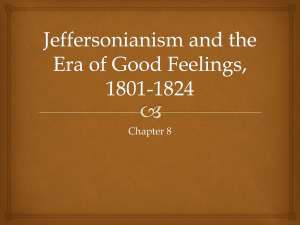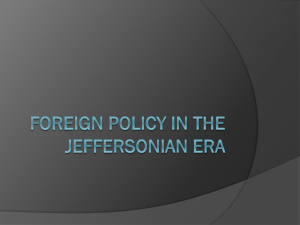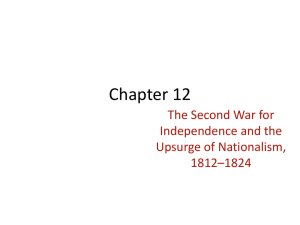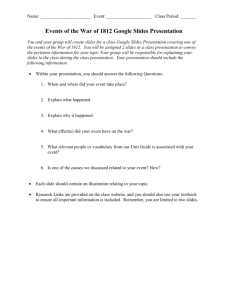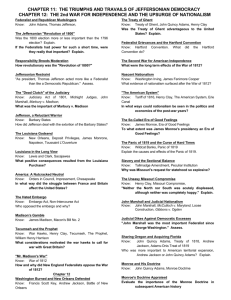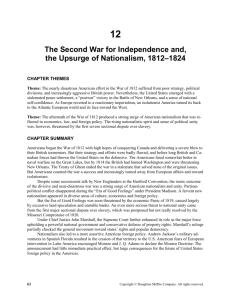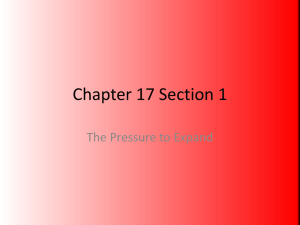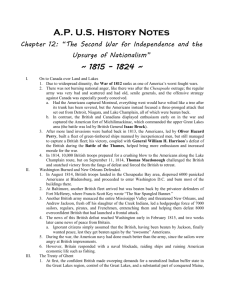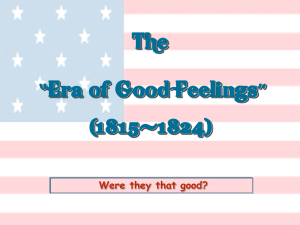1. War of 1812
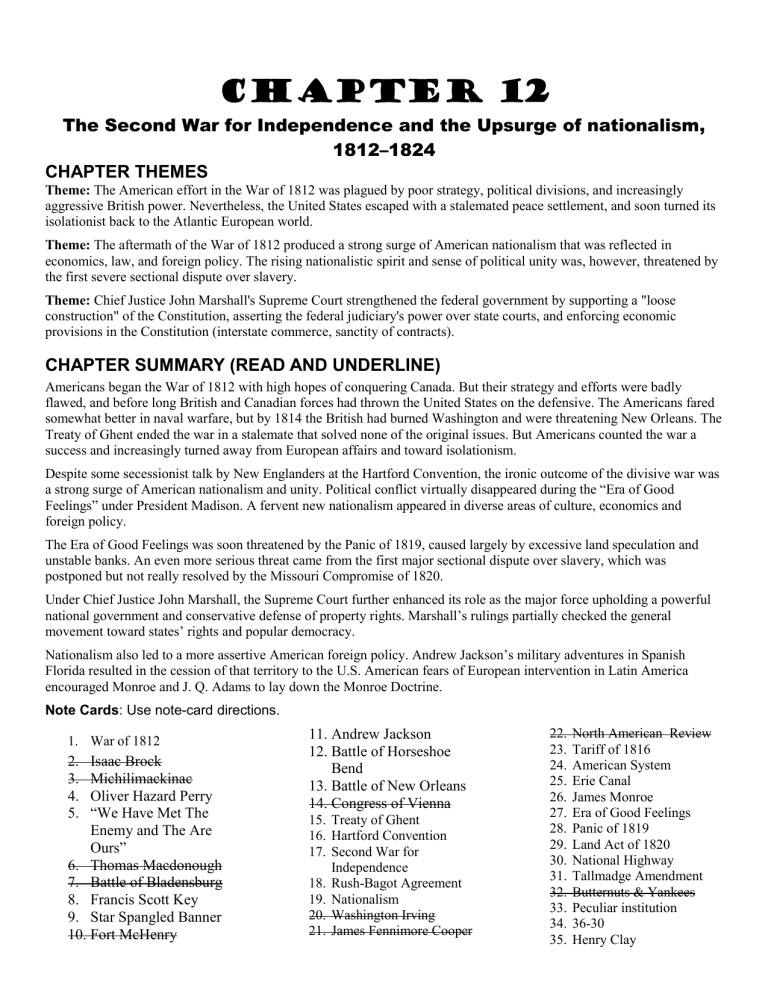
Chapter 12
The Second War for Independence and the Upsurge of nationalism,
1812–1824
CHAPTER THEMES
Theme: The American effort in the War of 1812 was plagued by poor strategy, political divisions, and increasingly aggressive British power. Nevertheless, the United States escaped with a stalemated peace settlement, and soon turned its isolationist back to the Atlantic European world.
Theme: The aftermath of the War of 1812 produced a strong surge of American nationalism that was reflected in economics, law, and foreign policy. The rising nationalistic spirit and sense of political unity was, however, threatened by the first severe sectional dispute over slavery.
Theme: Chief Justice John Marshall's Supreme Court strengthened the federal government by supporting a "loose construction" of the Constitution, asserting the federal judiciary's power over state courts, and enforcing economic provisions in the Constitution (interstate commerce, sanctity of contracts).
CHAPTER SUMMARY (READ AND UNDERLINE)
Americans began the War of 1812 with high hopes of conquering Canada. But their strategy and efforts were badly flawed, and before long British and Canadian forces had thrown the United States on the defensive. The Americans fared somewhat better in naval warfare, but by 1814 the British had burned Washington and were threatening New Orleans. The
Treaty of Ghent ended the war in a stalemate that solved none of the original issues. But Americans counted the war a success and increasingly turned away from European affairs and toward isolationism.
Despite some secessionist talk by New Englanders at the Hartford Convention, the ironic outcome of the divisive war was a strong surge of American nationalism and unity. Political conflict virtually disappeared during the “Era of Good
Feelings” under President Madison. A fervent new nationalism appeared in diverse areas of culture, economics and foreign policy.
The Era of Good Feelings was soon threatened by the Panic of 1819, caused largely by excessive land speculation and unstable banks. An even more serious threat came from the first major sectional dispute over slavery, which was postponed but not really resolved by the Missouri Compromise of 1820.
Under Chief Justice John Marshall, the Supreme Court further enhanced its role as the major force upholding a powerful national government and conservative defense of property rights. Marshall’s rulings partially checked the general movement toward states’ rights and popular democracy.
Nationalism also led to a more assertive American foreign policy. Andrew Jackson’s military adventures in Spanish
Florida resulted in the cession of that territory to the U.S. American fears of European intervention in Latin America encouraged Monroe and J. Q. Adams to lay down the Monroe Doctrine.
Note Cards : Use note-card directions.
1.
War of 1812
2.
Isaac Brock
3.
Michilimackinac
4.
Oliver Hazard Perry
5.
“We Have Met The
Enemy and The Are
Ours”
6.
Thomas Macdonough
7.
Battle of Bladensburg
8.
Francis Scott Key
9.
Star Spangled Banner
10.
Fort McHenry
11.
12.
Andrew Jackson
Battle of Horseshoe
Bend
13.
Battle of New Orleans
14.
Congress of Vienna
15.
Treaty of Ghent
16.
Hartford Convention
17.
Second War for
Independence
18.
Rush-Bagot Agreement
19.
Nationalism
20.
Washington Irving
21.
James Fennimore Cooper
22.
North American Review
23.
Tariff of 1816
24.
American System
25.
Erie Canal
26.
James Monroe
27.
Era of Good Feelings
28.
Panic of 1819
29.
Land Act of 1820
30.
National Highway
31.
Tallmadge Amendment
32.
Butternuts & Yankees
33.
Peculiar institution
34.
36-30
35.
Henry Clay
36.
MO Compromise
37.
McCulloch v. MD
38.
The Power To Tax Is The
Power To Destroy
39.
Loose Construction
40.
Cohens v. VA
41.
Gibbons v. Ogden
42.
Fletcher v. Peck
43.
Dartmouth College v.
Woodward
44.
Daniel Webster
45.
Convention of 1818
Chapter 12 Study Guide
Thought Questions/Observations:
46.
Monroe Doctrine
47.
George Canning
48.
FL Purchase Treaty of
1819 (Adams Onis Treaty)
49.
Russo American Treaty of
1824
On to Canada over Land and Lakes
1. What was the importance of Canada in the War of 1812?
2. Evaluate the success of the US navy in the fight for Canada and the defense of the United States.
Washington Burned and New Orleans Defended
3. What were some of the high- and low-lights for the United States in the War of 1812?
4. Did the United States fight the War of 1812 effectively? Explain.
The Treaty of Ghent
5. How did foreign events play into the ending of the war?
6. Evaluate the outcome of the Treaty of Ghent.
Federalist Grievances and the Hartford Convention
7. In what ways did New Englanders resist the war?
8. What did the Hartford Convention call for?
9. What was the impact of the Hartford Convention?
The Second War for American Independence
10. What were the long term effects of the War of 1812?
Nascent Nationalism
11. What evidence of nationalism surfaced after the War of 1812?
"The American System"
12. What were the fundamental parts of the American System?
13. In what ways could nationalism be seen in the politics and economics of the post-war years?
The So-Called Era of Good Feelings
14. What were James Monroe’s qualities as president?
15. What troubles made the period the “So Called Era of Good Feelings?”
The Panic of 1819 and the Curse of Hard Times
16. Explain the causes and effects of the Panic of 1819.
Growing Pains of the West
17. What factors led to the settlement of the West in the years following the War?
Slavery and the Sectional Balance
18. Why was Missouri's request for statehood so explosive?
Settlers of the Old Northwest
19. Analyze the differences between the successive waves of settlers to the Old Northwest
The Uneasy Missouri Compromise
20. "Neither the North nor South was acutely displeased, although neither was completely happy." Explain.
21. What were the short and long term effects of the Missouri Compromise?
John Marshall and Judicial Nationalism
22. Explain Marshall's statement, "Let the end be legitimate,...are constitutional."
Judicial Dikes Against Democratic Excesses
23. In what ways are Marshall’s decisions felt today?
24. "John Marshall was the most important Federalist since George Washington." Assess.
Sharing Oregon and Acquiring Florida
25. Analyze the importance of Andrew Jackson and John Quincy Adams to US territorial expansion
The Menace of Monarchy in America
26. How did Great Britain help support American desires regarding Latin America?
27. What was JQ Adams’ analysis of the British offer?
Monroe and His Doctrine
28. How could a militarily weak nation like the United States make such a bold statement ordering European nations to stay
out of the Americas?
Monroe's Doctrine Appraised
29. Evaluate the importance of the Monroe Doctrine in subsequent American history.
Analysis Questions (DO NOT DO THESE!)
1.
Is it valid to call the War of 1812 “America’s worst-fought war”? Was the cause of the failure essentially military, or was it an inevitable result of the political disunity over the war’s purposes? (One might compare the War of 1812 to other politically divisive conflicts like the Mexican War and the Vietnam War.)
2. Examine the Treaty of Ghent. Did the United States "win" this peace agreement? What international forces made this peace settlement a reality? Was the United States lucky that Britain had more important priorities than battling in the United States?
3. To what degree was the War of 1812 truly a Second War for Independence? Consider the battles, the politics, and the peace settlement. Compare it to the Revolutionary War.
4. What was significant about the strong spirit of nationalism that appeared in America from 1815 to 1824? What were its accomplishments?
5. Did the Missouri Compromise effectively deal with the sectional conflict over slavery or merely shove it out of view?
“The Missouri question absorbs, by its importance, and the excitement it has produced, every other.…I have never known a question so menacing to the tranquillity and even the continuance of our Union as the present one. All other subjects
have given way to it and appear to be almost forgotten.” James Monroe (1758–1831) (Letter to Jefferson, 1820)
“Our fate as a people is bound up in the question of preserving slavery. If we yield, we will be extirpated; but if we successfully resist we will be the greatest and most flourishing people of modern time. It is the best substratum of population in the world; and one on which great and flourishing commonwealths may be most easily and safely reared.”
John C. Calhoun of South Carolina (1782–1850) (Speech, 1838)
6. Did the Supreme Court decisions under John Marshall's leadership extend federal power too much? Is it appropriate that someone who was not elected should have such tremendous power to shape the government and the law? Is it appropriate that a political party's ideology be implemented through the judiciary?
“There, Brother Story, that’s the law. Now you find the precedents.” John Marshall
(1755–1835) (Comment to Justice
Joseph Story, c. 1820)
7. Was the Monroe Doctrine a valuable assertion of the principles of liberty and self-determination in the Americas against potential European and monarchical intrusion, or was it in effect an early manifestation of a patronizing and potentially imperialistic attitude by the United States toward Latin America?
8. Supreme Court decisions reinforce state and federal legislation. Assess the validity of this generalization for
THREE decisions of the Supreme Court prior to the Civil War.
9. The achievements of Generals are in the long run more decisive than the achievements of diplomats. Assess the
validity of this generalization for the U.S. in the period 1800 – 1825.
10. The Era of Good Feeling (1816-1824) marked the appearance of issues that transformed American politics in the
next 20 years. Assess the validity of this generalization.
11. At various times between 1789 and 1861, Americans changed their positions on the constitutional question of loose
construction or strict construction as best suited their economic or political interests. Discuss this statement with
reference to any TWO individuals or groups who took positions on this constitutional question.
12. Throughout our history, the Supreme Court has acted as a partisan political body rather than a neutral arbiter of
constitutional principles. Assess the validity of this generalization for the period 1800 – 1860.
13. Although the power of the national government increased during the early republic, this development often faced
serious opposition. Compare the motives and effectiveness of those opposed to the growing power of the national
government in TWO of the following.
Whisky Rebellion, 1794
Hartford Convention, 1814-1815
Virginia and Kentucky Resolutions, 1798-1799
Nullification Crisis, 1832-33
HISTORIC NOTES
Fighting against the military might of Great Britain for the second time in less than 30 years places significant strains on the U.S. politically, economically, and militarily. The Treaty of Ghent leaves in place most of the grievances that precipitated the war.
New Englanders and the Federalist Party strongly condemn the War of 1812. The Federalists meet to discuss their grievances in Hartford, CT in 1814. Many consider discussing secession at a future meeting, which, because the war ended, is never convened.
Following the war, a spirit of increased patriotism and nationalism sweeps the nation in what has been referred to as the Era of Good Feelings.
In order to integrate the sectional economies of the nation, Senator Henry Clay advocates what becomes known as the American System.
As the U.S expands westward, the question of containing slavery takes on an increasingly large role in the nation’s political affairs.
Concerned about possible European intervention in the affairs of the Western Hemisphere, President Monroe warns
Europe that the U.S. will not tolerate such interference.
Some historians consider the attempt to seize Canada as a reflection of early American imperialism, whereas others vies it as a key aspect of American military strategy.
Many historians see the Monroe Doctrine as a defensive and altruistic statement by the U.S. government. On the other hand, some historians view the Monroe Doctrine as the foundation of a hegemonic policy that became the cornerstone of future U.S. foreign policy.
Advanced Placement United States History Topic Outline
1. The Early Republic, 1789-1815
A. Washington, Hamilton, and shaping of the national government
B. Emergence of political parties: Federalists and Republicans
C. Republican Motherhood and education for women
D. Beginnings of the Second Great Awakening
E. Significance of Jefferson's presidency
F. Expansion into the trans-Appalachian West; American Indian resistance
G. Growth of slavery and free Black communities
H. The War of 1812 and its consequences
2. The Transformation of Politics in Antebellum America
A. Emergence of the second party system
B. Federal authority and its opponents: judicial federalism, the Bank War, tariff controversy, and states' rights debates
